- Home
- Jane Peart
Undaunted Spirit Page 4
Undaunted Spirit Read online
Page 4
Not that it was much of a place anyway. Some would call it a rabbit’s warren, four of us cramped into one small room. We shared a bureau and each had a chair and the bathroom was down two floors. But even so, it were our own. And most of us was friends and got along fine. Now, we’re scattered all over town anywheres we could find a room and some are pretty awful. Want half of what our weekly wages is. Most get breakfast but no evening meal. But you gotta take whatever you can. I’d chuck it all and go back home if I had one to go to, but Ma’s married again and there’s lots of little ones now. I ain’t a complainer usually. But what’s a girl to do?
That plaintive question rang in Mindy’s ears. It also gave her an idea. She would combine the letter with the reports of the fire and present the victim’s dilemma in an article that Jamison would be compelled to print. It would give her a chance to show her writing ability along with presenting the real problem of this girl and others like her. The devastating fire was not just a dramatic news report but a human tragedy. Dixie Dillon’s reply would follow the letter. It would be an answer designed to touch people’s hearts. She would show that these girls needed more than a decent place to live that they could afford, but also some comfort, some fun, some joy.
Mindy put aside the other letters and concentrated on writing a response to Aggie Sloane’s question. She worked steadily all afternoon, writing, rewriting, scratching out, tearing up, starting over again. Into the piece she poured some of her own emotions of being without a family, a real home, her lack of security and fear of the future.
When Mr. Jamison returned from the city council meeting, he gave her a curious look as he passed by on his way to his own desk, but he made no comment.
At last satisfied with the finished article, she copied it out carefully, attached it to Aggie’s letter, then walked over to Mr. Jamison’s desk. She stood there a full minute before he looked up. Then she placed it on top of his pile of copy to be okayed.
“Please read this, Mr. Jamison.”
He gave her an irritated look, mumbled something about being overworked as it was. Mindy said, “Please, Mr. Jamison.”
“Oh, all right.” He picked it up and she watched as his eyes moved rapidly across the page. Then he seemed to slow down and his reading became more deliberate. Finally he looked up at her. “This is good.”
“Really?” Mindy let out the breath she had been holding. He took his pen and scrawled a huge “OK” on it, then handed it back to her. The copy boy had already left for the day, so Mindy took it into the composing room herself and left it with the compositor to be set in the Dixie Dillon column for the next day’s edition.
The following afternoon, fresh off the press and still smelling of newly printed ink, that day’s edition was placed on Mindy’s desk by the mail clerk. With trembling hands Mindy opened it to the page where the Dixie Dillon column appeared and saw in bold type “WHAT’S A GIRL TO DO?”
Mindy read it through twice, relishing her choice of words and feeling a lump rise in her throat,
What if your own daughter were out in the world alone trying to make her way, working from six in the morning to six in the evening, and then had no place warm, comfortable, and welcoming to go to? We all benefit from the product these factory girls make as they stand at their machines hour after hour, so shouldn’t we do something to make their lives happier, safer, pleasanter? Shouldn’t we provide a place where they can gather to socialize, read, have refreshments? Would that not eliminate the harmful and often dangerous practice some of these lonely girls fall into of taking up with strange men, going with them to a tavern or worse, risking their virtue and even their very lives? We owe it to these girls who could be our sisters, our daughters, to do whatever we can.
She saw a few things in it she might, given the chance, change, a word that might have been better used. On the whole she was proud of the column. For the first time, it seemed really hers, not just something she had taken over from someone else. Before, she had adhered as much as possible to what her predecessor, the minister, had done, copying his style and the language of his replies. But today, the column had heart. It was hers. She felt she was truly Dixie Dillon.
Later that evening, when Judson came over to the house, she asked him, “So what do you think?”
“It’s a fine article, Mindy,” he acknowledged. “But I’d rather talk about us. Mother keeps asking when we’re going to announce our engagement. She wants to give a party for us.”
“Well, it would hardly be appropriate, Judson. My father’s only been dead a few months. I’m still officially in mourning.”
“I realize that, honey,” Judson said, taking her hand. “But now with your mother and Farell gone, it isn’t right for you to be alone. I want to take care of you. I want us to get married, Mindy.”
Gently, Mindy withdrew her hand. “You said you’d give me time, Judson. I think Mr. Jamison is coming around. I think he’s considering giving me reporter status.”
“Ah, Mindy!” Judson exclaimed exasperated. He got up from the swing where they’d been sitting. He plunged his hands in his pockets, walked over to the edge of the porch, and stood at the railing. Mindy could tell by the set of his shoulders that he was angry. “I’m afraid you’ll just keep putting it off. There’ll always be some reason, some excuse. Why is that stupid job more important than us?”
“It isn’t a stupid job, Judson, and of course, it’s not more important than us,” she protested. “Can’t you understand that I want to accomplish something on my own before I settle down and become just a housewife.”
“You’d not be ‘just a housewife,’ as you call it. And plenty of girls would be happy to be that, by the way. Mother thinks—” He halted, biting his lower lip as if he realized that his mother’s opinion might not be the most diplomatic thing to quote to Mindy at this point.
What Mrs. Powell had actually said was, “What’s the matter with that girl? Any girl in this town would be thrilled to have a young, handsome, personable man like you in love with her, begging her to get married. I think she’s foolish and headstrong, and my advice to you, Son, is to give some long and serious thought about pursuing this relationship any further.”
“I love Mindy, Mother. And I am going to marry her. No matter what,” Judson had said adamantly.
It was the “no matter what” that Judson was struggling with now.
Mindy came over to where he stood and put a tentative hand on his coat sleeve. “Don’t be cross, Judson. Be happy for me. Having this article printed without Mr. Jamison blue-penciling a single word or cutting it was really quite a step. You don’t know how much that means.”
Judson became aware of her nearness, the scent of apple blossoms on her hair and skin. His irritation faded away. He turned around and took Mindy in his arms, felt the warmth of her small, slender body under the crisp cotton blouse. He bent to kiss the warm, soft sweetness of her lips. He knew he couldn’t give Mindy up. No matter what his mother thought. Sure she was independent, outspoken and, yes, stubborn. Still, no matter how long it took he was determined to have her. She had spoiled any other girl for him.
Chapter 6
The response to “What’s a Girl to Do?” was greater than Mindy could have imagined. Mail began to pour into the newspaper office, first a trickle, then a flood. Mindy’s prose had touched even the hardest hearts in town with her question, “What if it were your daughter, or sister, alone in the world, forced to fend for herself?”
All sorts of suggestions and offers came as a result of Aggie Sloane’s letter, which Mindy had enhanced, adding details but written in the ungrammatical prose of the original. Mindy had somehow stepped into the girl’s place, told her story with poignancy appealing to the best in human nature.
Church Ladies United held a special meeting to see what they could do to better the factory girls’ lives. One of the local churches voted to keep their parish hall open in the evenings providing a place for the girls to gather after working hours. When th
is was announced, others entered into the plan. A lending library of wholesome books was started, a sewing center with a sewing machine and supplies was organized with volunteers to help the girls and teach them, refreshments of apple cider and homemade cookies and pies were donated. Everyone rallied around to show kindness to a group that had been largely ignored. Unusual friendships were formed between the factory girls and the women of the town who had been indifferent to each other before.
“Well, looks like you’ve done it, little lady.” Mr. Jamison stopped by her desk and tapped his forefinger on the stacks of letters that covered it. “Got enough work to do? Letters to answer?”
Mindy had learned that underneath Jamison’s gruff manner was a tender-hearted man easily moved by emotion. She had been sure once he read her article about Aggie Sloane he would allow her to print it.
“Yes, sir.” Mindy replied. Although slightly overwhelmed by the response, the problem was everyone thought it was Dixie Dillon’s triumph not hers. What was the use of writing such a successful piece if no one knew it was yours? She asked herself with some chagrin.
“Well, keep up the good work,” Jamison said and went back to his own desk.
Keep up the good work? Mindy raised her eyebrows. What did that mean? That she was stuck forever here as the advisor to the lovelorn? Even after what had happened as a result of “What’s a Girl to Do?”
No, she realized. She would somehow have to top even that if she were to move ahead. At least now she knew she could step into someone else’s life and write from their viewpoint. The possibilities were unlimited. She would just have to cull her mail, pick out an equally compelling problem, and dramatize it. In her heart, Mindy knew she had a gift, and she meant to use it.
Letters from readers continued to flow onto the desk of Dixie Dillon. It was, however, a letter from her mother that temporarily took her mind off her journalistic career. It was of a far more personal nature. Percy had written regularly ever since she and Farell had arrived in North Carolina. Descriptions of the Asbury’s lovely home, the mild climate, and their gracious host were described in detail. Mindy had kept her mother’s first letter to reread often to reassure herself that they had made the right decision.
Dr. Semple could not have prescribed a more pleasant or peaceful place for your brother to find rest and recovery. Farell was quite worn out when we arrived, however. We were met at the train by Mr. Belvedere Asbury, who as you may recall, was a college classmate of Dr. Semple. They have remained friends all these many years. Mr. Asbury is the epitome of a southern gentleman. He is very tall, dressed in a gray linen suit and an immaculate white shirt with a black bow string tie. His features are noble, his hair thick, wavy and silver-gray, his manners . . . well, think of a lord at some court. He welcomed us in a soft, slow voice, saw to our luggage and put us in his surrey with great courtesy.
The house, called “Linden Hill” set back from a country road in a grove of sweeping pine trees, is white, the windows framed by dark green shutters, and a deep porch leads through a fan-lighted door into the cool interior. His sister, Miss Louella, is as gentle and dainty as one could imagine, dressed in fluttery ruffles, and she speaks in a low and musical voice.
They made us feel immediately at home. I know in this environment, Farell is going to begin to feel better every day. For myself, I thank the good Lord for the friendship that brought us here and I am eternally grateful.
The six weeks that Dr. Semple had suggested would be needed for Farell to show any improvement lengthened. Two months later Percy wrote,
Each time I suggest to the Asburys that perhaps we better make plans to leave, they both urge us to remain, offering all sorts of enticements. There is to be a special party, or they are planning a day trip to see Chimney Rock, or a neighbor is giving a picnic in our honor. This climate has been so beneficial to Farell that I dare not refuse to stay longer. The Asburys are very persuasive, I wish you knew this lovely family as we have come to know them.
Each successive letter from Percy extolled the Asbury brother and sister. It seemed there was no end to their thoughtfulness. Each letter added another incident showing some further gesture of their kindness to both the McClarens. There were mentions of Mr. Asbury’s taking Percy for rides in the country, of introductions to equally genteel neighbors, of Miss Louella’s interest in Farell’s poetry, in fact, her setting one of his poems to music. It seemed Louella was quite talented at the piano and often gave concerts at social evenings. There were other accounts of afternoon teas and even dinner parties given by friends of the Asburys, at which Percy and Farell were honored guests.
Mindy wasn’t sure at what point and in which letter her mother had started to call Mr. Asbury by his first name, Belvedere. Even so, upon opening her mother’s letter this particular day, Mindy had not the slightest premonition of what it contained.
It had been nearly six months since her father’s death and five since her mother and Farell had left for North Carolina. The large McClaren house had not as yet sold. Realtors said it needed repairs and remodeling, which had been largely done piecemeal over the years of the family’s occupancy. To a prospective buyer these things became points over which to quibble for lowering the asking price. Mindy felt a vague uneasiness about all this. While she stayed busy with her work and spent most evenings with Judson, she tried to ignore the misgivings about the eventual sale of the house. Somewhere in the back of her mind was the unrealistic hope that her mother and Farell would return, and they could all move happily back into the family home.
She was totally unprepared for the drastic changes that she had not foreseen. She slit open the envelope and took out three thin pages of stationery written in her mother’s fine penmanship. “I hope it is not going to come as too much of a shock,” it began,
to tell you that Belvedere has asked me to be his wife. I have come to know, admire, and respect him very much in the time I have been here. He is the perfect gentleman, a wonderful companion, and I believe will be a wonderful husband. He was married once but was widowed after only three months. He told me that until now, no woman could possibly have replaced his bride. Not that I would ever want to erase the memory of the lovely young person he married at twenty, but I take it as a great compliment that such a refined, intelligent, interesting man wants to marry me.
After your dear father died I never thought to love again nor to remarry. That I should again have the love of a fine man for a second time in my life did not even seem possible. But this has happened, and I accept it gratefully.
A life without someone to whom you are special can be a lonely one, without purpose or joy. This, my dear daughter, is what I know you have in full measure with Judson. If I wasn’t assured how much Judson cares for you, wants to protect and provide for you, I would never consider Belvedere’s proposal. But knowing you and Judson will soon marry makes this decision easier for me. I hope you understand.
Farell does so heartily. He has come to regard Belvedere as a dear friend and, moreover, as an older brother. His health has improved almost miraculously since we came, and the doctors here feel he may soon be completely restored to health. He and Louella have become fast friends, they work on putting Farell’s poems to music nearly every day and enjoy each other’s company immensely.
I told Belvedere I wanted to write to my daughter and get her approval and blessing before we announce our plans formally.
Approval?
Was her mother really asking her for advice? A smile tipped the corners of Mindy’s mouth. Shades of Dixie Dillon. Her own mother writing to “lovelorn columnist?” It was almost funny. Actually, it seemed Percy had already made up her mind. Percy closed the letter by saying,
I have also written the bank and instructed them to take whatever offer they receive on our house. I see no reason to hold out for more money. Belvedere has assured me I never need worry about financial matters. He also joins me in love to you and the hope that one day soon you may decide to come here and mak
e your home. He says you would be most welcome.
Did her mother really think she would give up her job and go to live with the Asburys in North Carolina? Her mother must be completely dazzled by her new romance to think that she would. From the letters, Mindy envisioned the picture of the happy foursome at the Asbury’s country home. There was no place there for her even if she wanted to go.
She was happy for her mother and brother. The tiny nagging sensation of being left out was only momentary. She had her own life to live, and, of course, there was Judson.
Mindy refolded the letter and put it back in the envelope. After this startling news, Mindy knew she must make plans of her own. She knew that once she told Judson of her mother’s plans, he would insist on setting a date. That was the last thing she wanted to be pressured into doing. Not until she accomplished her goal of being assigned the status of being a real reporter. She would never be satisfied until that happened.
Chapter 7
Judson’s parents were celebrating their thirtieth wedding anniversary. They had planned a large afternoon reception, and the guest list was long and included most of the prominent people of Woodhaven. Of course, Mindy was invited. Moreover, Jamison had also assigned her to cover the event for the social page of the newspaper.
Because Mindy knew she would not have time to return home to change before the Powell’s party, Mindy wore her jade-green silk dress to work. She felt self-conscious under Jamison’s critical glance as she passed his desk on her way to her own. I’m not going to explain. He should know where I’m going. She removed her small feathered hat, put it aside, and started to go through her mail, always hoping to find another thought-provoking subject about which she could write a feature article. But nothing unusual arrived in the day’s mail.
For her column, Mindy chose a letter from a young bride who complained about her mother-in-law’s constant criticism. Mindy suggested that she listen politely to her husband’s mother, in order to avoid conflict—and then do things her own way. Mindy could not help wondering if she could accept her own advice when and if she were to become Mrs. Judson Powell.

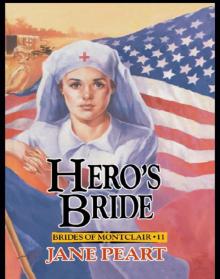 Hero's Bride
Hero's Bride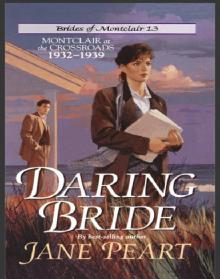 Daring Bride
Daring Bride Runaway Heart
Runaway Heart Promise of the Valley
Promise of the Valley Gallant Bride
Gallant Bride The Pledge, Value
The Pledge, Value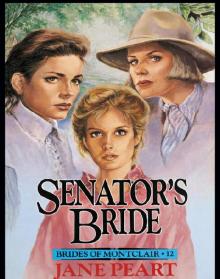 Senator's Bride
Senator's Bride Valiant Bride
Valiant Bride Shadow Bride
Shadow Bride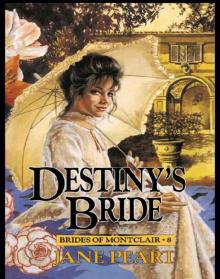 Destiny's Bride
Destiny's Bride A Tangled Web
A Tangled Web Folly's Bride
Folly's Bride The Promise
The Promise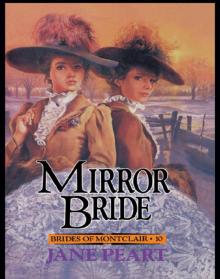 Mirror Bride
Mirror Bride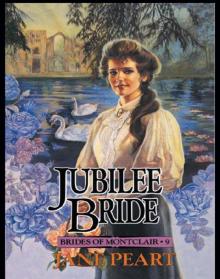 Jubilee Bride
Jubilee Bride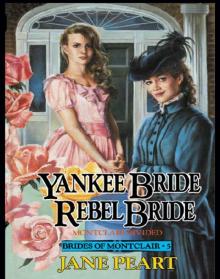 Yankee Bride / Rebel Bride
Yankee Bride / Rebel Bride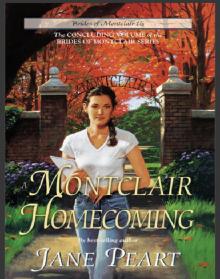 A Montclair Homecoming
A Montclair Homecoming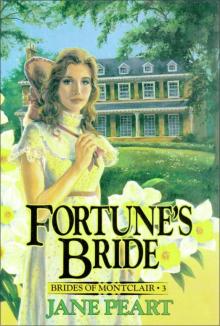 Fortune's Bride
Fortune's Bride Undaunted Spirit
Undaunted Spirit Love Takes Flight
Love Takes Flight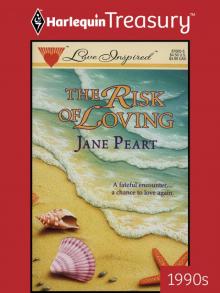 The Risk of Loving
The Risk of Loving The Pattern
The Pattern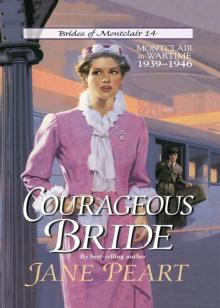 Courageous Bride
Courageous Bride